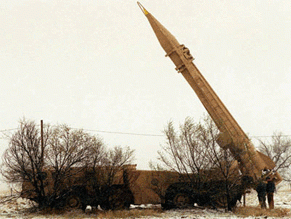|
World Jewish News

Scud missiles (photo by blogs.discovermagazine.com)
|
Unclear whether Syria Scuds reached Hezbollah, U.S. officials say
17.04.2010, Israel and the World Syria intended to move long-range Scud missiles to Lebanese Hezbollah guerrillas, U.S. officials said Friday, adding, however, that there were doubts about whether the Scuds were delivered in full and whether they were moved to Lebanon.
The alleged deal to transfer the Scud missiles to Hezbollah has fueled cross-border tensions with Israel and could cast doubt on U.S. President Barack Obama's diplomatic outreach to Syria.
"We think the intent is there," a senior U.S. official said of Syria transferring the missiles to Hezbollah, a Iranian- and Syrian-backed Islamist group that fought a war with Israel in 2006.
But the senior official and two others briefed on the case said it was unclear whether the missiles, which could hit deep inside Israel, were actually handed over in full to the guerrilla group. The officials spoke on condition of anonymity because of the sensitivity of the matter.
"We believe a transfer of some kind occurred but it is unclear if the rockets themselves have changed hands," the senior official said.
A partial transfer could involve weapons parts, documents or funding, other officials said.
Another official said doubts were growing that Syria had delivered the Scuds in full and allowed them to transit to Lebanese territory: "We don't believe it happened."
Also Friday, the London-based pan Arab daily Asharq al-Awsat quoted Hezbollah's deputy secretary general Naim Qassem as saying that the allegations of an arms deal with Syria were meant to cover Israel's tense ties with the United States as well as to divert international attention from Israel's nuclear program.
While the reports of a long-range missile deal with Syria were false, the Hezbollah deputy chief added, that did not mean that the militant organization was not continually arming itself in preparation of a possible war with Israel.
Earlier on Friday a Hezbollah government minister said that whether or not they have acquired scud missiles is none of Israel's business.
Minister Hussein Haj Hassan says the group was always arming and preparing itself but he refused to confirm or deny Israeli allegations that the militant Lebanese group has acquired Scud missiles.
Israel's president Shimon Peres earlier this week directly accused Damascus of providing the scud missiles, a charge Syria denied.
The U.S. State Department responded to the allegations on Wednesday by saying that if they were true, "it would put Lebanon at a significant risk."
Haj Hassan, meanwhile, told Hezbollah's Al-Manar TV on Friday that since Israel possessed all kinds of weapons, it's only natural for Lebanon to have the means to defend itself against an Israeli attack.
There was no immediate comment from Israeli officials.
Hezbollah's leader, Sheik Hassan Nasrallah, has said his militants have more than 30,000 rockets and are capable of hitting anywhere in Israel. Those claims match Israeli intelligence assessments.
On Tuesday, the Kuwaiti daily Al-Rai Al-Aam reported that Syria had shipped ballistic Scud missiles to Hezbollah fighters in Lebanon. The White House said it has raised concerns with Syria about the report.
Israeli officials say the introduction of Scuds could alter the strategic balance with Hezbollah, the Iranian-backed militia that battled Israel in a month-long war in 2006. Hezbollah pelted Israel with nearly 4,000 unguided Katyusha rockets during the war, causing widespread damage and dozens of casualties in Israel's north. Scud missiles have several times the range and explosive firepower of Katyusha rockets and would pose a much more serious threat.
In Washington, the Syrian Embassy dismissed the allegations of shipping scud missiles and accused Israel of trying to divert attention from questions about Israel's nuclear program. Israel is widely believed to possess nuclear arms, though it does not confirm nor deny this.
Israel charges that most of Hezbollah's weapons, including rockets, come through neighboring Syria, which is a main sponsor of Hezbollah, along with Iran.
Hezbollah refuses to discuss arms at national dialogue session
At a Lebanese national dialogue session on Friday, the Hezbollah-led opposition insisted on stopping debate regarding their arms, arguing that "Lebanon has no alternative but the Resistance (Hezbollah) to defend the country."
Hezbollah MP Mohammed Raad hinted at boycotting dialogue sessions if debate continued on Hezbollah arms rather than other political issues facing the country.
"Either we want a serious dialogue under the Defense Strategy topic that includes key aspects of military, security, political, media, cultural, social and economic, or we don't want a serious dialogue, but rather exchange rhetoric," Raad told the session.
"If this is the case, then we are not willing to continue to participate in the dialogue," Raad warned.
Christian Lebanese Forces leader Samir Geagea, also a member of the majority, hit back, saying "we have the right to discuss the issue of weapons here at the dialogue table."
"I tell you I am going to criticize the Resistance (Hezbollah) arms in every statement. This is our political right," Geagea said.
The Shiite militant group is the only faction that refused to surrender its weapons after Lebanon's 1975-1990 civil war. It argues they are necessary to defend the country against Israel.
United Nations Resolution 1701, which ended 33-day war between Israel and Hezbollah in July 2006, called for disarming all militant groups, including Hezbollah, leaving only the Lebanese army in possession of any weapons.
In 2009 elections, Hezbollah won 13 seats in parliament. The Lebanese Shiite movement also has two ministers in Premier Saad Hariri's national unity cabinet.
Haaretz.com
|
|
